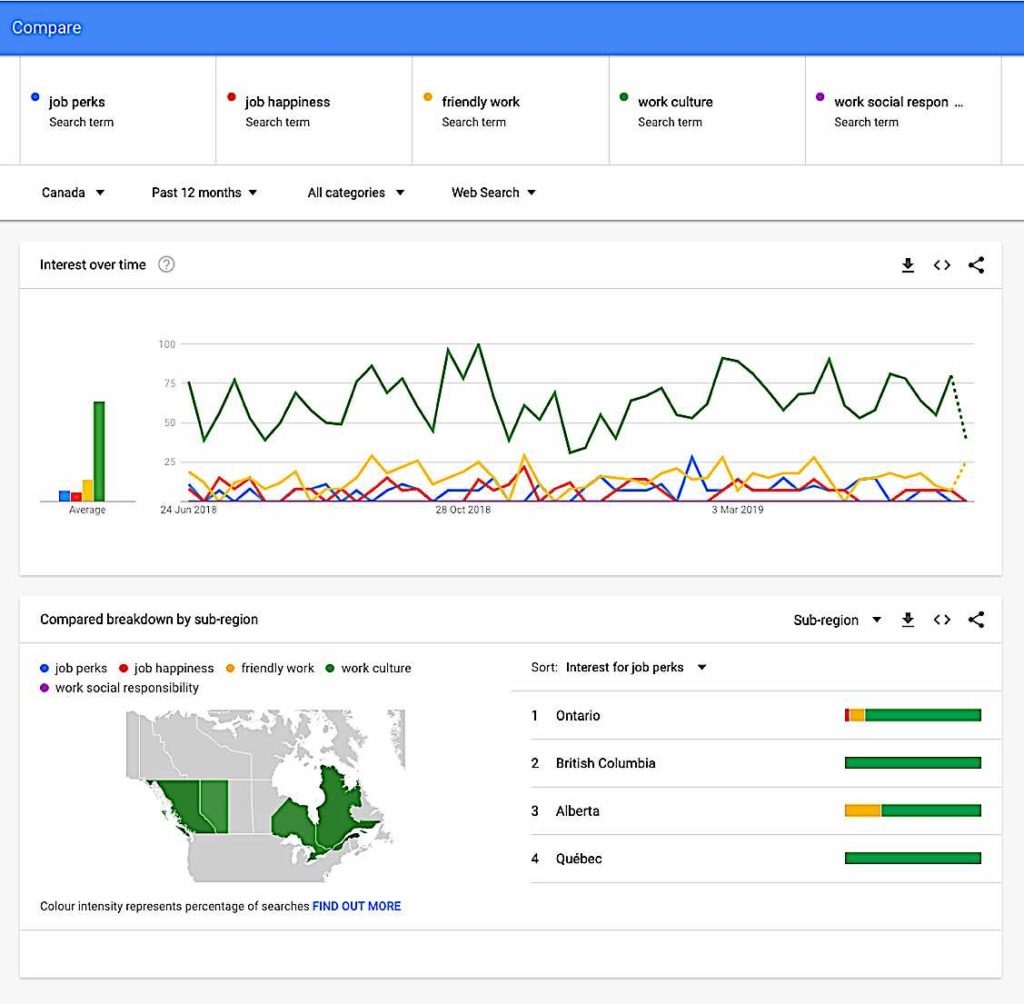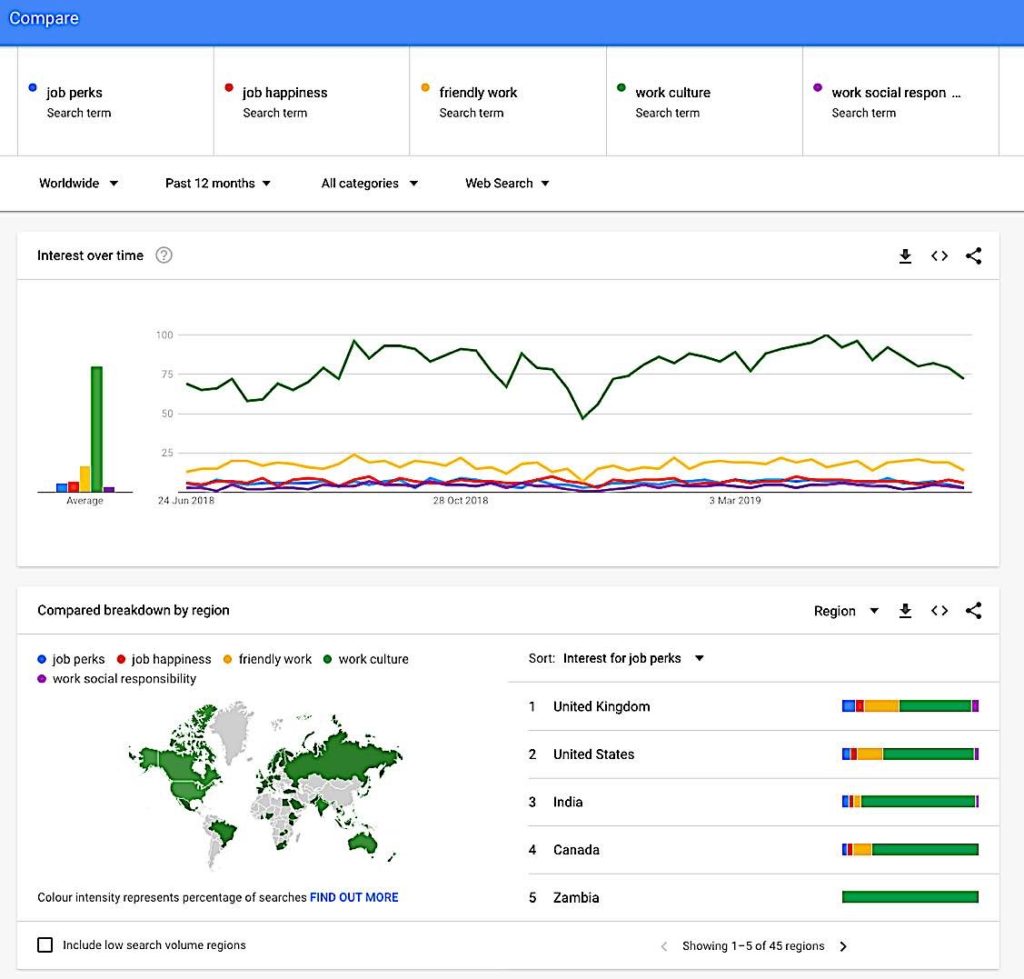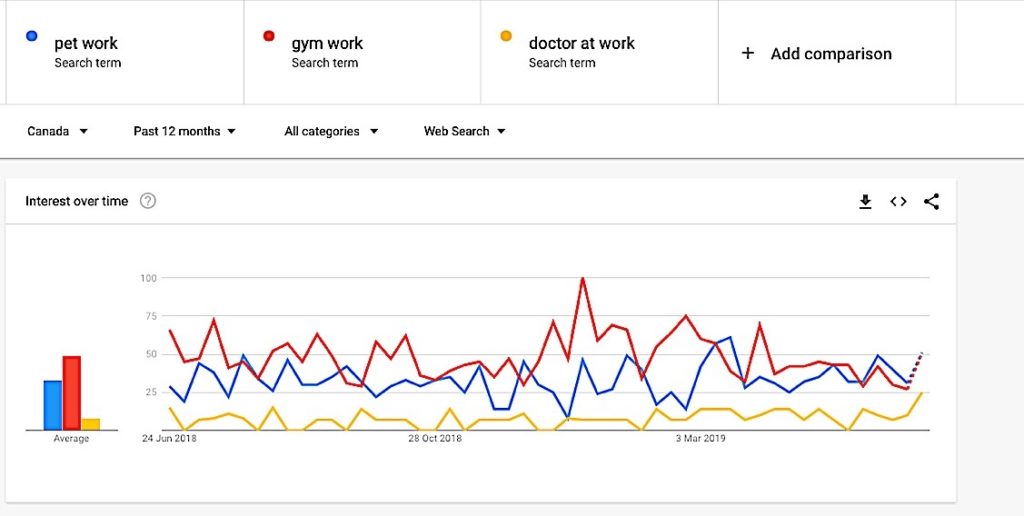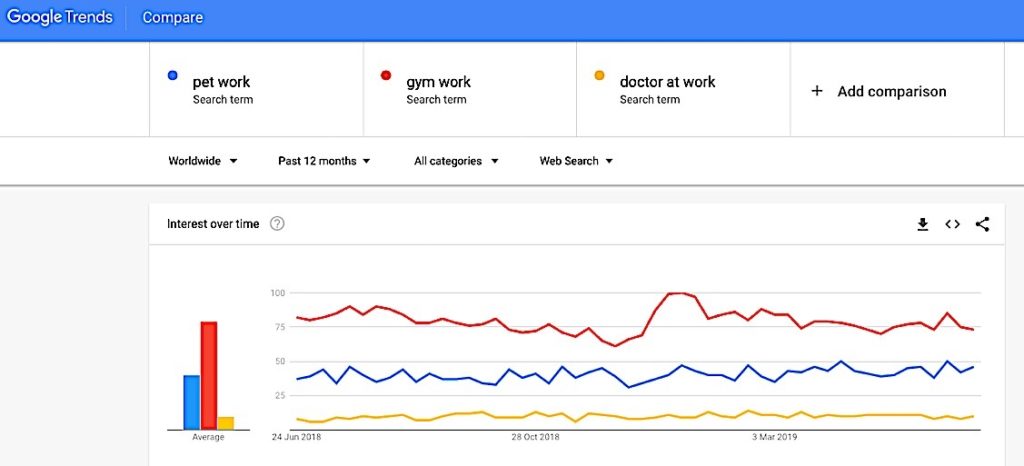
What are job seekers looking for? Work culture dominates trends: important insights for recruiters
Traditionally, recruiters, HR Managers, and employers have held to the notions that job seekers are most strongly weighing salary and benefits when choosing between jobs in a competitive market.
Data on GoogleTrends and internet search information helps broaden our understanding of what sought-after employees truly care about — giving you the edge in both recruitment, and in managing your existing teams, especially in Canada where benefits tend to be unique.

“Work Culture” dominates
On Google Trends [1] the most searched keyword from job seekers is: “Work Culture.” As foggy as the term may seem to be, it dramatically outweighs the follow-on keywords “job perks”, “job happiness”, “friendly work”, and “work social responsibility.”
You can argue that culture is made up of all of these things and more — the combination of a friendly environment, social responsibility and stress-free workplace. According to Google trends, however, in the last 12 months — after salary and benefits — “work culture” dominates the job seeker’s criteria.

Millennials are “special”
Millennials certainly have different priorities in terms of job searching, with “loving what you do” near the top. Their top search term is “perks” — those special benefits that define a work opportunity — at 8,500 searches according to SEMrush (an SEO trending tool.) [2]
- Do you need help recruiting Millennials or other prospects in a competitive job market? Consider a consultation with the experts at Pivotal Solutions>>
Negative features of workplaces dominate
It is perhaps indicative of modern concerns, that SEMRush reports work-related “concerns” are among the most searched terms — after “job perks” (According to a SEMrush report [2]). You can argue these all relate to “workplace culture,” but they deserve special attention. Jobseekers are wary of workplaces with a reputation (especially online) of:
- Ethics issues
- Bullying
- Harassment
- Diversity
For many job seekers, these factors far outweigh salary and benefits.

According to SEMrush’s report, the specific keyword hits in their sample were weighed this way, among Millennials:
- Perks (8,500)
- Ethics (3,500)
- Bullying (3,100)
- Harassment (2,800)
- Diversity (1,100)
Discrimination searches up 69%
Searches for “Discrimination” increased by sixty-nine percent in the last three years, according to the report. The report also revealed these trends:
- “Workplace Discrimination” searches up 69%
- “Workplace Harassment” searches up 22%
- “Ethics” searches up 18%
- “Depression” searches up 17%.

Loving what you do
In the competitive job space, with unemployment low and retention of top talent problematic, the critical issue becomes creating a workplace that inspires people to say, “I love what I do.” This means salary and benefits are less important than a “happy” place. It’s not easy, because people are unique. Rather than trying to cater to every hot prospective employee, the key is to focus on some of the trending “love what you do” features and making them real in your workplace.

What are perks, anyway?
According to the report from SEMrush, perks aren’t just about health plans and pensions. However, in Canada, according to the report, trendy benefits may not be the deciding factor. From the report [3]:
“Trendy workplace benefits, such as having an in-house doctor and permission to bring pets to work regularly, coupled with old standbys such as gym memberships, are not necessarily high on Canadians’ radars, at least not in relation to a strong deciding factor like health coverage when considering whether or not to accept a job offer.”
On the other hand, Google trends tend to disagree with this statement, with a gym and work and pet at work trending fairly strongly (see inset graphic above for Canada, below for worldwide.)

Do you need help recruiting in a competitive recruiting environment. Ask the experts at Pivotal Solutions for a consultation:
Permanent Contact Us Form
NOTES
[1] Google Trends
[2] “Perks most popular query by job seekers: Report”
[3] “Which work-related terms are dominating Canadian’s online job searches?” Benefits Canada


 Our HR solutions experts can recommend the right mix of HR outsourced services to make your entry into Canada easier.
Our HR solutions experts can recommend the right mix of HR outsourced services to make your entry into Canada easier.  Pivotal Employment Management Services co-hires your workforce, simplifying entry of your business in Canada.
Pivotal Employment Management Services co-hires your workforce, simplifying entry of your business in Canada. 
















Don't Allow Standard Expectations to be What Sets Employers Apart